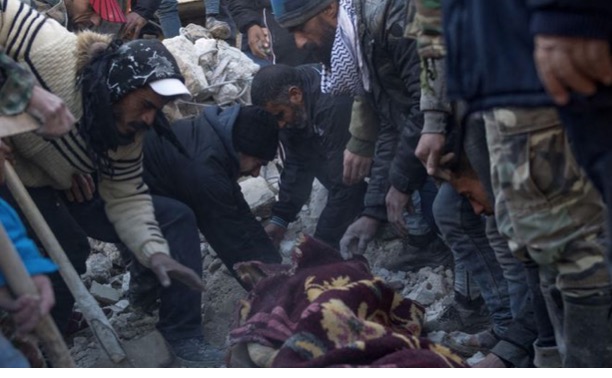Comments
EARTHQUAKE DEVASTATION - A disaster response expert has implored the United States to lift its economic sanctions against Syria, warning that the restrictions are hampering rescue and relief operations in the earthquake-ravaged country.
"We need heavy equipment, ambulances, and firefighting vehicles to continue to rescue and remove the rubble, and this entails lifting sanctions on Syria as soon as possible," Khaled Hboubati, president of the Syrian Arab Red Crescent, said Tuesday at a press conference.
"The number of victims is likely to rise, and a number of buildings are still at risk of collapsing. The results of the earthquake are disastrous, and our volunteers are ready, but we lack equipment," said Hboubati. "We call on donor countries to cooperate to lift the blockade."
A 7.8 magnitude earthquake and at least 54 powerful aftershocks, including a 7.5 magnitude earthquake, struck southeastern Turkey and northern Syria on Monday, causing massive damage to both countries. At least 9,057 people in Turkey and 2,530 people in Syria have died so far and tens of thousands are injured. The United Nations emphasizesthat the full scale of the disaster is still coming into view as thousands remain trapped under rubble.
An estimated 10.9 million people, many of whom are refugees already displaced by armed conflicts, have been affected by the earthquake catastrophe in the northern Syrian provinces of Hama, Latakia, Idlib, Aleppo, and Tartus. Roughly 100,000 people are now believed to be homeless in Aleppo alone, according to the U.N., which says that just 30,000 have found shelter in schools and mosques, leaving 70,000 vulnerable to newly arrived snow.
"Lift the economic sanctions imposed on Syria and the Syrian people. Open the way for us. We are ready to provide assistance."
While "several countries including the U.S. and its allies have extended their support to Turkey in its relief and rescue work, they have refused to extend similar assistance to Syria," Peoples DispatchreportedTuesday. "The U.S. State Department made it clear on Monday that it was only willing to support some work carried out in Syria by NGOs, but that it would have no dealings with the Bashar al-Assad government."
As Al Jazeerareported, State Department spokesperson Ned Price told reporters on Monday that "it would be quite ironic—if not even counterproductive—for us to reach out to a government that has brutalized its people over the course of a dozen years now."
"Instead, we have humanitarian partners on the ground who can provide the type of assistance in the aftermath of these tragic earthquakes," said Price.
But experts have pointed out that leaving sanctions intact impedes the ability of NGOs to swiftly deliver aid to devastated populations in Syria.
As the American-Arab Anti-Discrimination Committee (ADC) explainedMonday: "Currently any U.S.-based aid and relief efforts are required to ensure that they follow the Department of Treasury's Office of Foreign Asset Control (OFAC) guidance, or risk prosecution. This adds unnecessary and inhumane delays to organizations and individuals looking to support those in immediate need."
"We commend and are thankful to existing organizations on the ground providing immediate humanitarian aid and relief to those in Syria, Turkey, and across the region," said ADC director Abed Ayoub director. "The reality is more aid and relief is needed, and time is of the essence. Lifting of the sanctions will open the doors for additional and supplemental aid that will provide immediate relief to those in need."
Syrian Foreign Minister Faisal Mekdad toldAl-Mayadeen on Monday that the government is willing "to provide all the required facilities to international organizations so they can give Syrians humanitarian aid."
Price, however, indicated that Washington has no plans to soften its stance toward the government of Syrian President Bashar al-Assad, which it deems illegitimate due to accusations of war crimes and human rights violations committed during an ongoing civil war that erupted after Assad brutally repressed pro-democracy protests in 2011.
“This is a regime that has never shown any inclination to put the welfare, the well-being, the interests of its people first," the U.S. diplomat said Monday. "Now that its people are suffering even more, we're going to continue doing what has proven effective over the course of the past dozen years or so—providing significant amounts of humanitarian assistance to partners on the ground."
Meanwhile, humanitarian groups on the ground continue to question the effectiveness of Washington's approach.
"Lift the economic sanctions imposed on Syria and the Syrian people," Hboubati said Tuesday. "Open the way for us. We are ready to provide assistance. We are ready to provide aid through the crossline and to send aid convoys to Idlib."
Hboubati stressed that the Syrian Arab Red Crescent does "not differentiate between any of the Syrian people" and called on the U.N., the European Union, and the U.S. Agency for International Development to support its mission.
Since the Caesar Act, passed by the U.S. Congress and signed into law by former President Donald Trump, went into effect in 2020, "any group or company doing business with the Syrian government faces sanctions," Peoples Dispatch reported. "The act extends the scope of the previously existing sanctions on Syria, imposed by the U.S. and its European allies since the beginning of the war in the country in 2011."
"The impact of sanctions on Syria's health and other social sectors and its overall economic recovery has been criticized by the U.N. on several occasions in the past," the outlet noted. "The U.N. has also demanded that all unilateral punitive measures against Syria be lifted."
(Kenny Stancil is a staff writer for Common Dreams where this article was first published.)

















